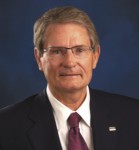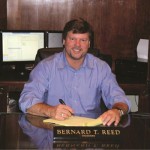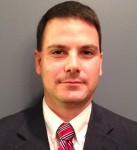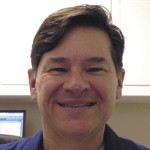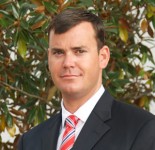Most leaders know the importance of creating high-performance teams within an organization. However, the challenge is actually moving from theory to execution in creating winning teams. Great leaders know how to mobilize teams and lead them to accomplish their full potential. In their book, The Wisdom of Teams, Jon Katzenbach and Douglas Smith describe a high functioning team as with one with “a number of people with complementary skills who are committed to a common purpose, performance goals, and an approach for which they are mutually accountable.” My interviewee this week, Freddie J. Bagley, Chairman of Community Bancshares, Inc., is one of those leaders who has harnessed the power of teamwork to achieve tremendous success.
Bagley, a native of Forest, first learned about building great teams as a student-athlete at Forest High School. He credits his high school coaches and teachers including Ken Gordon, Ken Bramlett, and Milton Walker with teaching him that, “a good team that works together will always defeat a team of stars.” Bagley went on to East Central Community College where he was an All-Star quarterback, and then Mississippi College where he graduated with a degree in Mathematics. After a brief teaching and coaching career, Bagley was recruited by Thomas Colbert to join Farmers and Merchants Bank (now Community Bank) in 1976. The rest, as they say, is history. Bagley has the spent the last 38 years developing as a leader and helping the organization grow from a $17 million dollar bank to one with over $2.5 billion in assets.
Bagley is a purpose driven man with a clear set of priorities – faith, family, and career. He has lived out these priorities by being an active leader in his church, and an engaged parent to three children (and now three grandchildren). Bagley noted, “Through my faith and family support, I have been able to pursue a fulfilling career in banking. I do feel that God has led me to where I am, and I have been blessed, there is no question about it.” Bagley credits Colbert (now Senior Chairman of Community Bancshares, Inc.) with helping him develop as a leader. Bagley shared, “Thomas believed in young people who wanted to accomplish things. He let you learn from your mistakes, then would help lead you where you needed to go by well-placed questions and suggestions. He always made you feel like to you could anything or everything. He was a great encourager to me.”
Bagley explained that his philosophy has been to put the customer first and treat each one with dignity and respect. He said, “To have a customer focused business, you must have the best people all working with the same purpose in mind.” He also shared, “One thing that I learned at an early age about leadership is that you have to give up some of your personal goals to accomplish team goals.” Bagley has put these principles into practice over the years with great success. Today, Community Bank through its family of companies has 41 offices across the South with over 670 employees. In addition to his leadership at work, home and in the community, Bagley is also a leader in his industry. He is currently serving as the 126th Chairman of the Mississippi Banking Association. He noted, “The MBA has a top notch staff and as an association, we have to keep finding things that we can all agree on. We must remain unified and work together on the things that are important to Mississippi banking.” I am sure Bagley will continue to bring his team-based philosophy to this role as well as his other leadership positions making a positive difference for the state.
[Originally published in the Mississippi Business Journal, December 4, 2014.] Read More


